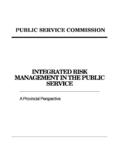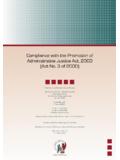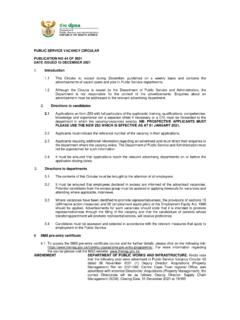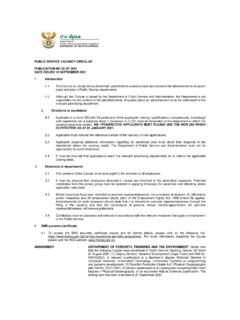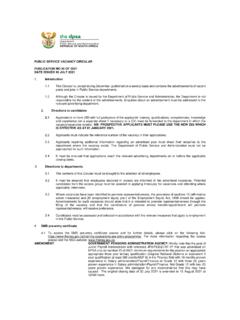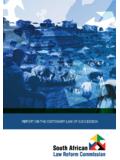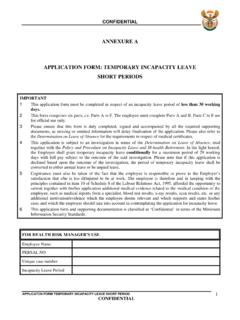Transcription of GUIDE TO CORRECT IRREGULAR APPOINTMENTS - PSC
1 GUIDE TO CORRECT IRREGULAR APPOINTMENTS PUBLIC SERVICE COMMISSION JUNE 2018 1 GUIDE TO CORRECT IRREGULAR APPOINTMENTS CONTENTS Pages 1. Introduction and background 2 2. Purpose 2 3. PSC Mandate 3 4. Discussion 4 5. When is an appointment considered IRREGULAR ? 6 6. Correcting APPOINTMENTS made irregularly 8 7. Steps to CORRECT IRREGULAR APPOINTMENTS 14 8. Conclusion 16 2 1. INTRODUCTION AND BACKGROUND It has come to the attention of the Public Service Commission (PSC) that some departments have, subsequent to receipt of the PSC s recommendations on IRREGULAR APPOINTMENTS , enquired as to how they should go about implementing the recommendations.
2 In view of this, it was decided that a brief GUIDE be developed to assist departments in this regard. IRREGULAR APPOINTMENTS are often discovered when disgruntled employees or third parties- complain to the PSC that there were irregularities in the filling of certain posts by departments, or refer grievances/complaints relating to posts for consideration by the PSC in terms of section 196(4)(g)(ii) of the Constitution of the Republic of South Africa,1996 (the Constitution) read with section 35 of the Public Service Act, 1994. IRREGULAR APPOINTMENTS or promotions are potentially unlawful. It was found in Khumalo and Another v Member of the Executive Council for Education: KwaZulu Natal [2013] ZACC 49; 2014 (3) BCLR 333 (CC); (2014) 35 ILJ 613 (CC) (18 December 2013) (the Khumalo case), that APPOINTMENTS made irregularly are not automatically null and void1 because the appointed candidate has labour rights.
3 It was further held in this case that only a court can grant a just and equitable order in terms of section 172(1)(b) of the Constitution, when considering the consequences of declaring a decision unlawful. Until a court pronounces on the validity of the act (the appointment ), the act exists in fact and has legal effect in terms of which its legal consequences will continue to exist. This would mean that the appointment or promotion, irrespective of the irregularities, would remain valid until and unless a court of law declares the action unlawful. The Court explicitly viewed functionaries as being not entitled but duty bound to seek redress of an irregularity in a court of law.
4 There are also instances where departments / executive authorities (EAs) themselves discover irregularities that occurred in the process of appointing employees (without the matter having been investigated by the PSC). 2. PURPOSE The purpose of the GUIDE is to assist EAs to implement the PSC s recommendations relating to APPOINTMENTS made irregularly; on own accord and upon discovering that an appointment was made irregularly, CORRECT the action or omission; ensure accountability, promote and maintain a high standard of professional ethics; ensure fair labour practices and administrative actions that are lawful, reasonable and procedurally fair; and ensure compliance with the basic values and principles governing public administration.
5 1 Null and void means cancelled or invalid 3 3. PSC MANDATE The mandate of the PSC is as outlined in the table below. Legislation Stipulations Section 196(2) of the Constitution The PSC must, amongst others, exercise its powers and functions in the interest of the maintenance of effective and efficient administration and a high standard of professional ethics in the Public Service. Section 196(4) of the Constitution The powers and functions of the PSC are (a) to promote the values and principles set out in section 195, throughout the public service; (b) to investigate, monitor and evaluate the organisation and administration, and the personnel practices, of the public service; (c) to propose measures to ensure effective and efficient performance within the public service; (d) to give directions aimed at ensuring that personnel procedures relating to recruitment, transfers, promotions and dismissals comply with the values and principles set out in section 195.
6 (e) to report in respect of its activities and the performance of its functions, including any finding it may make and directions and advice it may give, and to provide an evaluation of the extent to which the values and principles set out in section 195 are complied with; and (f) either of its own accord or on receipt of any complaint (i) to investigate and evaluate the application of personnel and public administration practices, and to report to the relevant executive authority and legislature; (ii) to investigate grievances of employees in the public service concerning official acts or omissions, and recommend appropriate remedies; (iii) to monitor and investigate adherence to applicable procedures in the public service; and (iv) to advise national and provincial organs of state regarding personnel practices in the public service, including those relating to the recruitment, appointment , transfer, discharge and other aspects of the careers of employees in the public service.
7 4 This GUIDE is therefore issued in terms of the PSC s mandate as outlined above with specific reference to the powers to give advice, propose measures and recommend appropriate remedies to departments. 4. DISCUSSION The Constitution makes reference to recommendations in the context of grievances section 196(4)(f)(ii)) and determines as follows: The PSC either of its own accord, or on receipt of any complaint- ii. investigate grievances of employees in the Public Service concerning official acts or omissions and to recommend appropriate remedies ; In addition, section 35 of the Public Service Act, 1994 determines the following: (1) For the purposes of asserting his or her right to have his or her complaint or grievance concerning an official act or omission investigated and considered by the Commission, an employee may lodge that complaint or grievance with the relevant executive authority under the prescribed circumstances, on the prescribed conditions and in the prescribed manner, and if that complaint or grievance is not resolved to the satisfaction of such an employee, that executive authority shall submit the complaint or grievance to the Commission in the prescribed manner and at the prescribed time or within the prescribed period.
8 (2) After the Commission has investigated and considered any such complaint or grievance, the Commission may recommend that the relevant executive authority acts in terms of a particular provision or particular provisions of this Act or any other law if, having regard to the circumstances of the case, the Commission considers it appropriate to make such a recommendation. The word recommendation is not defined in the Constitution; the Public Service Commission Act, 1997; the Public Service Act 1994 or the Grievance Rules, 2003. In terms of the Collins Dictionary, recommendations of a person or a committee are their suggestions or advice on what is the best thing to do.
9 The words suggestions and advice suggest that recommendations by nature are not enforceable. According to the Oxford Dictionary, the word "recommend" is defined as suggest as fit for some purpose or use and advise as a course of action, etc. The Thesaurus indicates that the word "recommendation" is similar to that of advice (proposal, suggestion and counsel) and reference (commendation, blessing, approval, sanction and good word) . Given the above definitions it can be concluded that there is a similarity between recommendations and advice. However, given the constitutional mandate, the PSC s Protocol Document on the Issuing of Directions indicates that the following principles should apply: (i) Recommendations can be made regarding a wide spectrum of public administration and personnel issues which can range from providing guidance for public administration and service delivery improvement to instances of addressing 5 non-adherence to prevailing prescripts; (ii) A distinction needs to be drawn between generic and specific recommendations.
10 Generic recommendations provide guidance on how public administration or service delivery can be improved. Specific recommendations, on the other hand, require very specific administrative action from departments especially regarding non-adherence to prescripts. (iii) Whether generic or specific, departments can either implement the recommendations or disagree with the recommendations, but reasons need to be furnished to the PSC for non-implementation of specific recommendations. The PSC needs to monitor the implementation of its recommendations by departments. The monitoring of the implementation of the PSC s recommendations is guided by a Protocol for Monitoring Implementation of the Recommendations of the PSC.


